We’re going to do something a little different for this installment of Below the Line’s ongoing composer series.
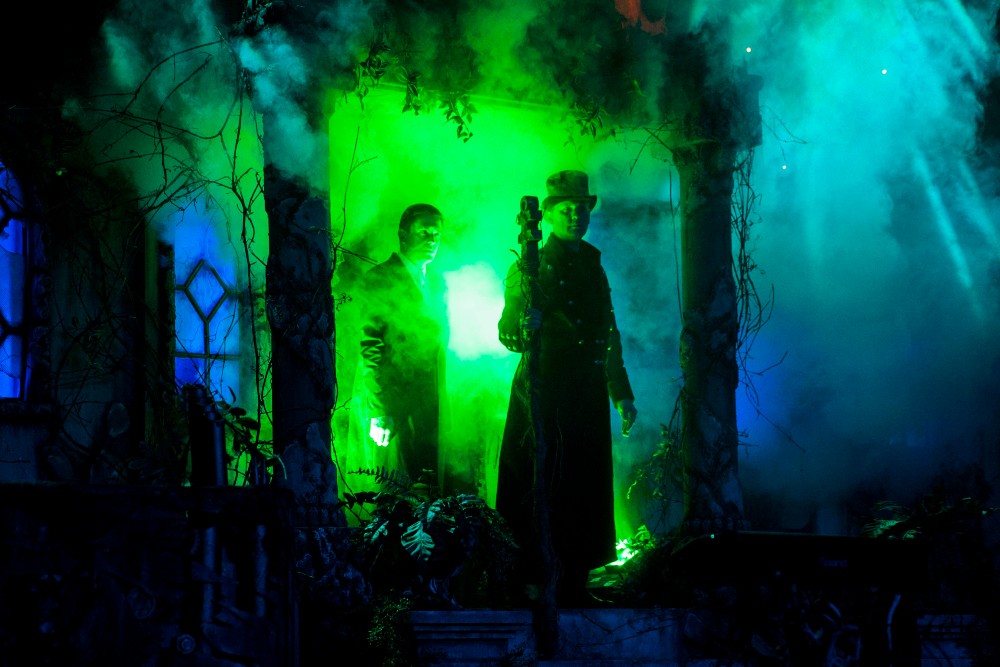
If you’re a fan of Halloween and haunted houses and spooky amusement park rides, you have almost definitely heard the music of Midnight Syndicate, the collaborative music and experiential performance project by Edward Douglas* and Gavin Goszka. For over 20 years, the Chardon, Ohio-based duo has been creating eerie, mostly instrumental and orchestral records that would be perfect for any horror movie from the past 50 years. In fact, the music from those horror movies was part of the inspiration for Midnight Syndicate’s music, and in turn, it has led to the duo creating a residential immersive Halloween show at Cedar Point in Sandusky, Ohio, which is now in its fifth year.
(*You might notice a distinct similarity between the name of one of Midnight Syndicate’s members and the writer of this interview. Edward Douglas, the musician, and Edward Douglas, Below the Line Editor, have been acquainted for a number of years, often when one of them is confused for the other, which happens far too often.)
Aside from their records and the Cedar Point residential, the Midnight Syndicate have created so much spooky music in their 20+ year history — they’re at 23 albums and counting! — that the group’s music being used by Universal’s Halloween Horror Nights and other amusement and theme parks around Halloween time. They even recently released a limited edition vinyl album collecting some of that music from Halloween Horror Nights, as well as their own live album collected from the Cedar Point shows, called Live Shadows.
With October being Halloween season i.e. Midnight Syndicate’s busiest time of year, Below the Line thought it would be fun to get on Zoom with the Midnight Syndicate’s Edward Douglas, and we were joined ten minutes into the conversation by his collaborator, Gavin. The conversation includes some interesting insights about the collaboration process, which is so important in music, and other aspects of creativity.
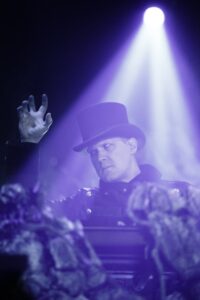
Below the Line: Let’s start from the beginning and how you and Gavin met, and how Midnight Syndicate came about. Were you both musicians or composers on other projects?
Edward Douglas: Midnight Syndicate started more as a solo project for me back in ’96, and my goal was to create a band that would release these soundtracks to imaginary films. I was going to do that by blending mostly instrumental music with sound effects. I love the immersive sound design of the old Shadow Radio dramas, and just that whole idea that sounds blended with music can really pull you in. And so, that was the idea behind Midnight Syndicate, and it was a bit far out for the time, I think, just the way we were going about doing it. I did the first Midnight Syndicate album in ’97, and it laid the groundwork for everything that was to come afterwards. But it was really eclectic. Although most of the songs had a darker tilt to them, they weren’t all strictly horror, and it wasn’t all strictly the dark, orchestral instrumental music that we’ve become known for now. The thing that did keep them all tied together was that it was this instrumental music mostly blended with sound effects and stuff.
It was at that time that Gavin, who worked at my local music store, helped me basically build my studio, and we had become friends over the years. I had a demo of about 24 or so songs that I wanted to consider for this first Midnight Syndicate album. I took those songs to him just to get his feedback, see which ones he liked, which ones he didn’t like. And so, he was like a sounding board from the very beginning. After that first album was released, I really wanted to narrow the focus of Midnight Syndicate on what I did best and what I was most comfortable with and that was definitely the horror-themed stuff.
Everything that I’ve done creatively throughout my life has always had that horror slant to it, or that Twilight Zone, Tales from the Crypt kind of feel to it. That is what I love, the classic Universal horror. So that’s definitely a realm I’m most comfortable in, and I feel like the best songs on that first Midnight Syndicate album were the dark, orchestral instrumental music, and that is also what I love. I like composing instrumental music, but mostly orchestral music. That’s just what I probably do best and it’s what I enjoy most. So that was going to be the direction of the next Midnight Syndicate album, which was Born of the Night. At that point, I also decided I don’t want to do all the writing. I really needed another creative partner who could share the load with writing that could really be the other half of Midnight Syndicate. And that’s when I reached out to Gavin. He was already familiar with the music and knew the direction I wanted to take the band in, and he was totally on board with that. We got together and we created the musical Born of the Night. It was at that time that I also reached out to a local artist — his name was Joseph Vargo, and I brought him on board mainly for his artwork, and his marketing. He really knew the whole Gothic esthetic. We got him involved, and he was also putting in some voiceovers, added that element to that particular album and was involved in that. Musically, it was Gavin and I creating all the stuff, and that’s been us ever since. Gavin and I have co-written the music on every Midnight Syndicate album since — he writes half the music, I write half the music, and it’s a constant going back and forth and working with each other on each album. There are a couple movie soundtracks that we’ve done that have been more just me, and that’s The Rage, The Dead Matter, and The Axe Giant. But outside those, the actual Midnight Syndicate albums are all a blend of both of us just working together
BTL: Do you both play keyboards or different instruments? What’s the musical breakdown of what you each do?
Douglas: I think we consider ourselves both composers at heart, but Gavin is an accomplished pianist — he’ll downplay that, but I think he’s really good. I grew up playing the organ, and that’s where I got my basics on playing keyboards and the piano, and that helped with the composing. I also play bass guitar and Gavin is also a percussionist, so that’s really helped on Midnight Syndicate albums, his talent on playing percussion. He went through classical training at Baldwin Wallace [University in Berea, Ohio], and I primarily came from just a rock’n’roll background and then just kind of moved into the composing side, more movie soundtrack type stuff. Most of my influences were movie soundtrack composers and heavy metal.
BTL: I haven’t listened to all of Midnight Syndicate’s records. The ones I have, what’s really struck me is that grand old church organ, and I can hear the influence of Bach’s melodies and scales, which always bring a sense of dread when played on organ.
Douglas: So true. Recently, I’ve dug even further into the classical composers that inspired all the composers that inspired me. For me personally, it was John Williams, Jerry Goldsmith, Danny Elfman. It was movie soundtrack composers, even John Carpenter, that really formulated my biggest influences. In years that have come since, I’ve dug deeper into the classical composers that inspired them, Bach huge, huge, huge and Beethoven and Wagner. There’s just so many amazing [composers] that created the music that’s inspired us to this day.
At this point, the other half of the Midnight Syndicate, Gavin Goszka, joins the Zoom.
Douglas: Gavin, we just talked a bit about how we started, how we met at the music store, and how the first album was more of a solo album but then you and I have written all the music on the Midnight Syndicate album since as a duo. We had the opportunity to work with a lot of cool cover artists that, especially for instrumental music, you really need that strong aesthetic to pull people in.
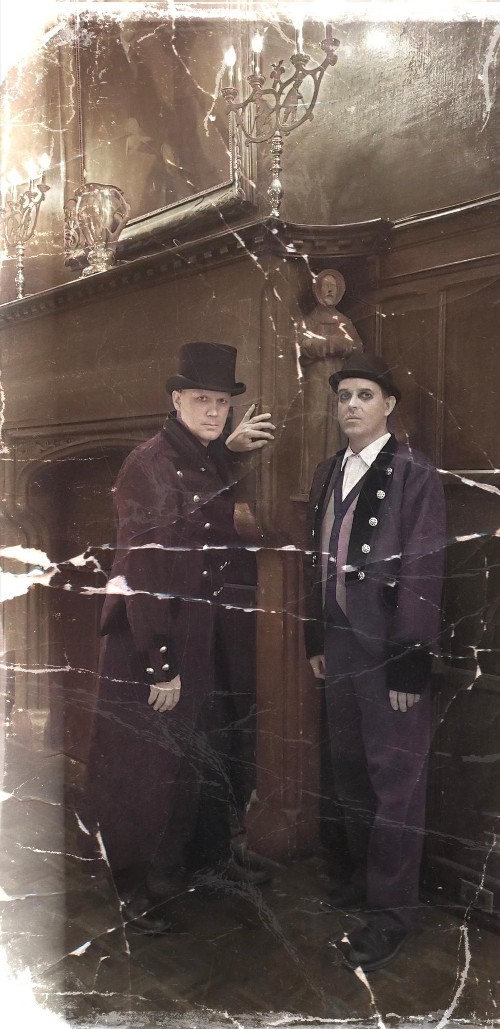
BTL: I do want to go back and ask Gavin about his background before you two started working together. Were you working in a computer department putting together music systems or just a regular recording department when you were first approached by Ed to give some thoughts on his music?
Goszka: Kind of regular recording. I was kind of jumping around to different departments of the store, actually. I worked in the back in the repair department for a while, and I’d fill if someone was missing in the front of the shop, but mainly keyboards and audio were my thing. Ed had come into the store as a customer and looking for some equipment, and we got to talking, and he told me about Midnight Syndicate and what he was doing with that. It was right when the self-titled album was coming out. Actually, I was one of the people who reviewed for him. I went over the mixes and gave opinions about the production, the songs and everything like that. Then, I went to see the live show he had done, and after that, we saw a lot of common ground between us with horror and everything. I said, “Hey, if you ever need somebody to write with or work with, I’d love to be a part of this.” It was probably a couple of months later that he called me and said, “Hey, there’s this Born of the Night project on the horizon…”
Douglas: And we took it from there.
BTL: Ed mentioned that you’re a piano player and percussionist, and that those are your main instruments that you learned or trained for?
Goszka: I learned on the Hammond organ way back in the day, and then I kind of migrated to different instruments. I learned drums in high school, self-taught on bass guitar, and a little bit on guitar and vocals and stuff. I think it was in college where the musicianship kind of kicked in. Up until that, you don’t realize where you’re at in terms of your abilities, what you know what you don’t know. College was kind of a big eye-opener as far as what I didn’t know and how much I couldn’t play. [chuckles]
BTL: Ed also mentioned you split up the writing duties on records. How does that work? Are you each writing your own songs and finishing them from beginning to end, or do you eventually share the files and the other person adds things? Is one of you better on bass and just plays bass on everything, for instance?
Goszka: I think a lot of people are surprised to hear that we actually write completely separately, but we always keep in touch as far as the sound of the material and making sure what we’re looking for out of a specific album. Do we have a fast song? Do we have too many slow songs? I tend to start on piano more than anything. I’ll just kind of flesh out the basic song, and then I’ll get into arranging mode, where I’ll start layering in the different instruments. Ed tends to bring in more fully arranged versions of his songs along the way, which is always nice to be able to hear what he’s intending.
Douglas: We just bounce our ideas off of each other. “Here’s where this song is at? What do you think?” There’s that constant interplay, as we send different versions, and somebody will give some feedback, and we’ll process it, and then we’ll make adjustments to the tracks as we’re working on them, so it is a very back and forth. That’s what I think brings out the best in both of us, the ability to bounce ideas off of each other on everything we do throughout the process.
BTL: Are you generally using Pro Tools or Logic these days? I’m sure the way you’ve worked has changed since you first started collaborating.
Goszka: I’m definitely Logic-based. I used to use Digital Performer back in the day. I was on that for a long time, but then I forget why I decided to try Logic, but there’s no going back after that. It was like, “Oh, wow, why didn’t I switch to this earlier?”
Douglas: I’ll tell you. I started in cakewalk back in 93 and I’ve never really changed. It’s my go-to to this day. It does what I need it to do. Now, early on in our careers, I would bring my Cakewalk files and audio recordings to Gavin, and we would mix them together at his studio using very organic boards like the Yamaha O3D and the O2R. It was very much like twisting knobs as the song was being played back in real time. Right, Gavin? Now, so much is all automated, but no, those early Midnight Syndicate albums, we were right there, taking the stuff and doing manuals fads on the board.
Goszka: We were basically our own automation, like Born of the Night, what was that, an Alessis board, I think I had? It was completely not automated, so if you needed to make an EQ tweak while you were recording, you just did it.
Douglas: Then, the automated boards came, the Yamahas, and now, Good Lord. All of that stuff is obsolete practically.
Goszka: The prices of the equipment and what’s available. A bedroom recording artist nowadays is insane. I wish we had access to what we have access to now, like years and years ago.
BTL: At this point, you never really need to leave the computer. Are you using real instruments at all? I know you play percussion, Gavin, so do you have some real percussion you put on tracks as well?
Goszka: Most everything nowadays, it’s all sample based. I used to have an electronic drum set that I used to trigger things with — one of the Roland TB kits, that you can either trigger the sounds themselves or use it to trigger from a sample library. I just find it’s easier nowadays to just use samples. You don’t have to mic anything.
BTL: How about you, Ed? I know you mentioned playing organ, and the pipe organ sounds massive on your records. Do you ever get access to a real church pipe organ?
Douglas: It’s always been a mix of organic instruments when possible, and now, a blend of the samples. The sample libraries have just become really wonderful, because you can tweak them just the way you want, and it is a lot easier. I still think that the human voice — choirs have definitely improved over the years — but still, some of the best stuff that we’ve recorded and has been with wonderful real vocalists that just add that wonderful punch to any arrangement that we’re doing.
BTL: Do you work with any specific vocalists who are always on your records?
Douglas: We’ve mixed it up over the years. Amber Foth is a local artist that we work with. We’ve been very fortunate to work with a lot of vocalists brought to us from Cedar Point for our live shows. They have an incredible wealth of talent. They’ve actually introduced us to a lot of really amazing vocalists that we’ve been able to work within our live shows and feature on our Live Shadows album, and yeah, probably on future recordings once we get back into the studio and start. We did Bloodlines, but we’ll be doing more studio recordings in the coming years, for sure.
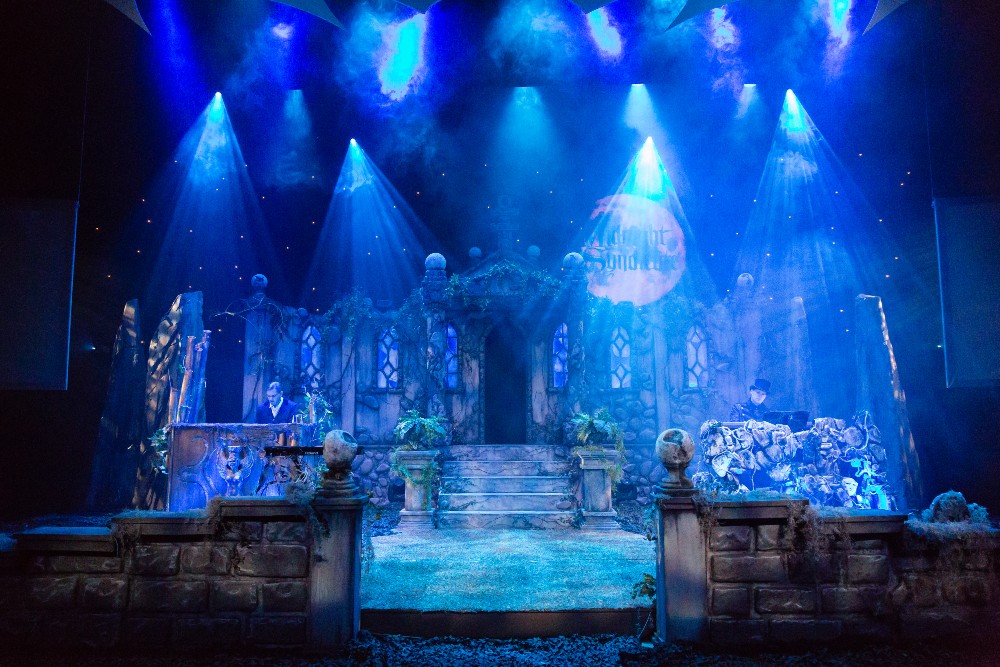
BTL: That seems like a good transition into your live shows at Cedar Point, though I do have some more questions about the records. Are the Cedar Point shows just the two of you and maybe some singers?
Goszka: We definitely use an entire cast for the shows. We’re kind of the core of the shows, but we definitely have a female vocalist. There are actors, there’s film, there are a lot of different elements — it’s really supposed to be like an immersive show. To do that, I think we pull from a lot of different resources, but it is definitely not a two-person show. That was one of the things that we talked about way back when we were talking about the idea of doing a live performance. I don’t think either of us really wanted to have two guys up on stage with keyboards performing under lights. It had to be more than that. You have so much to watch. It’s almost like you can watch four different versions of the show, just depending on what you’re looking at or focusing on.
BTL: I’ve been lucky in that I’ve seen two or three different incarnations of Goblin live, as well as John Carpenter.
Douglas: I did get to see [Carpenter] live, and I saw Alan Howarth playing live, and even that was a big thrill. It’s a little different for us from Goblin in that it’s mostly orchestral music where Goblin has that rock element to it, which I think makes it a little more compelling to watch if you just watch them perform We have our work cut out for us, making this orchestral music, to make a really compelling show.
BTL: You mentioned films as part of the shows, so do you use films you made yourself or others?
Douglas: I started in theater. Music has been a constant throughout my entire life, but most of my studies have surrounded theater and film. My first project out of college was a film that I scored, so it was kind of bringing my music and theater and film backgrounds together. And then, the first Midnight Syndicate live shows in 98 were also a merging of this multimedia type stuff, where it’s film that we shoot and theater and music all blended together. We produced a movie called The Dead Matter in 2010, and that’s a movie that we directed and scored and all that. We were able to get in contact with a lot of people in that industry, and now we utilize those people to create original content for all of our live shows. You can utilize all the resources and our experience that we’ve acquired over the years with these live shows.
BTL: As musical director for these shows, are you also involved in the filmmaking part of it, too, Gavin? How does that work on that part of the show?
Goszka: I’ll throw out ideas. Film is definitely not my thing, and I focus on music.
Douglas: As we develop the shows and the stories for the shows, it has become much like our albums where it’s give and take and just throwing ideas back and forth to each other. It’s become a really wonderful collaborative process, just like the albums, developing these live shows. That’s really been kind of cool, and I think our skill sets compliment each other nicely.
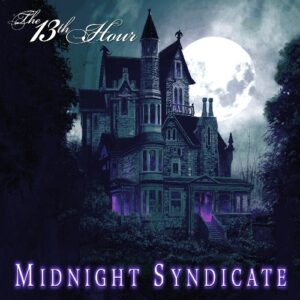
BTL: Going back to your records, there are definitely albums that have concepts, but I’m not sure you can call them concept albums, since there are no lyrics tying the songs together, other than the song titles. How do you come up with those album themes and how does that work with two people writing music separately?
Goszka: We’re usually on the same page as far as what we want out of a given theme or an album. It’s just a matter of kicking ideas back and forth like. “Okay, let’s take it in this direction or that direction or make sure we include this or that elements for atmospheric tracks or whatever. Usually, when we go into a given project, it’s kind of like a unified vision. It’s like, “Okay, we’re gonna do an album based on a haunted mansion or vampires, and here’s the general layout of things.” It’s just a matter of getting the specific ideas out around that….
Douglas: [We] develop the world, and then kind of say, “Oh, I can see this character in this world. I could see this room or this scene within this world that we’re creating, and then maybe that fires an idea for a song. Or maybe we’re writing a song, and then through the creative back and forth process, we find a home for those songs or those songs flesh out the world that we’re trying to create on that album.
BTL: You spoke earlier about how sound effects play a part on your records, so are those things you’re creating yourself or that you’re getting from sound effect libraries? I know that the BBC released their whole sound effects library a few years back.
Douglas: What’s available online, just what you can get now, it’s just so much different from when we started. It’s just so funny to see how things have changed since 1996. We LOVE trying to create all of our sound effects, originally. Some of them it’s just too impractical to do, from a time and resource standpoint, but I think some of the best sound design we’ve done comes when we are able to capture it live out there in the world and/or create it within the studio. As we were talking about before, the sound effects, blended with the music, I think really just elevates and really makes it so much more immersive. I think “immersive is a word we’re using a lot lately to describe our live shows, but it’s also about our albums, too. We want you to lose yourself in the album when you listen to it and close your eyes. That’s, I think, what we’re all about, and I think that sound effect element in what we do is a key part of that.
Goszka: It really helps bring the worlds to life in a more complete way. The music itself is fine, but if you can add in some sound effects, especially in certain environments, I think it just really adds the icing on the cake. It adds a level of additional immersion.
Douglas: I think Carnival Arcane is one of our best examples of that, though, Gates of Delirium and 13th Hour are big ones for that as well. But Carnival Arcane, we spent a lot of time studying turn of the century carnivals and what you might hear and experience in one of those to develop the sound palette that we use throughout that album.
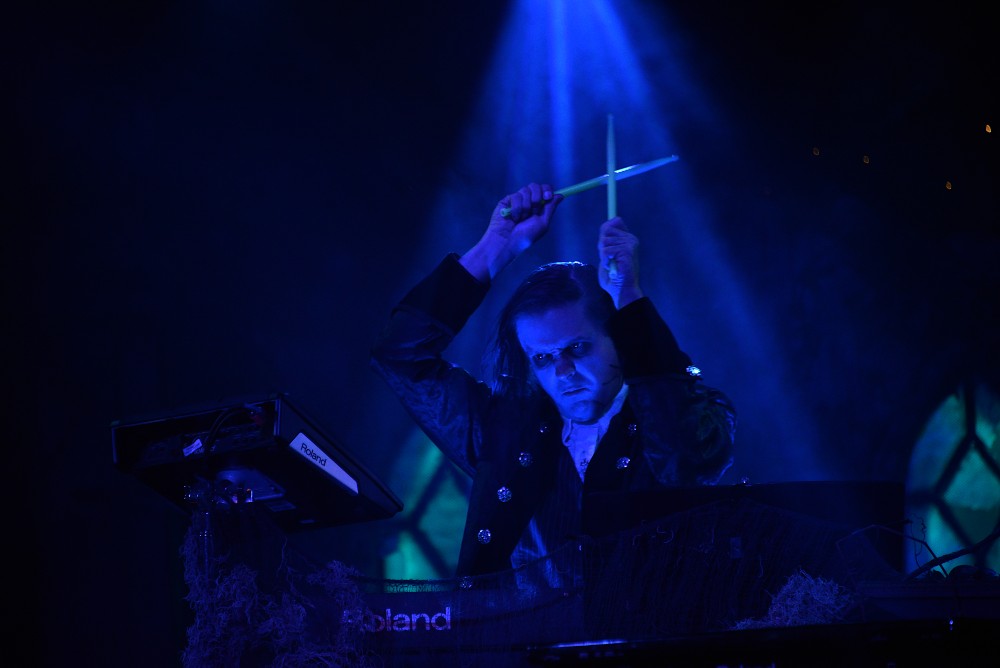
BTL: I know your music is being used a lot at amusement parks and events like Halloween Horror Nights. Are people hearing your records and then reaching out to use it in these places? Or are you creating new music for whatever they’re doing?
Douglas: Remember when we were talking way back to the beginning, the idea of Midnight Syndicate was that it’s gonna be a band that creates soundtracks to imaginary horror-themed films. It was a really far-out concept at the time, back in 97. You had a band called Mortis doing fantasy, and you had Vangelis and even Danzig doing single albums, but no band saying, “Hey, this is what we’re gonna do every time out.” It was really hard for us to find our audience initially, and no record label would really pay attention to us, because they didn’t get what we were trying to do. What we did is we had to go find our audience, and we found that our audience was — and we knew this when we were developing the albums, too — are people that like Halloween are really gonna enjoy playing [this music] at their house, at home. Haunted attractions and amusement parks were using either classic AC/DC like “Hell’s Bells” or the John Carpenter Halloween theme, or old sound effects tapes from the 50s and such, which had a very dated sound, but they wanted more. So we were like, “Oh, they’re gonna like this.” So, we went out to the amusement parks, we went out to the haunted houses, we went out to people that liked Halloween, we went out to people that like gaming, like role-playing games that are looking for cool background music when they play. It was just about pounding the pavement and getting our music out to those people. Once they heard it, they’re like, “Oh, my gosh, I’d love to use this in our park, in our haunted house.” And it literally built upon that, and it still builds to this day. People hear the music, and they think, “Wow, I could really use this for this application. I’d love to use this in a game or a theatrical production.” It’s kind of worked from there. We have done some custom work, like we did some custom work for Halloween Horror Nights. But a lot of times, this is music we do that people like, then use in their other productions. And so, it’s been a really good thing.
Goszka: Ed summed it up pretty nicely, but yeah, I think most of it’s been just using existing library music. It’s been rare that we’ve actually written something for someone in specific.
Douglas: With the exception of the movie soundtracks that I mentioned to you, like The Rage and the Dead Matter.
BTL: Are you just not as interested in writing music specifically for other projects, like movies and television? If someone asked, “Can you write the music for my horror movie? Here’s a lot of money.” Does that not interest you as much, or would you rather just write music for the visuals in your own heads?
Goszka: You’ve had a lot more experience with this than I have, but if you’re writing for something like a film or whatever, you’re very much at the mercy of the filmmaker. I mean, it’s all what the filmmaker needs, and the vision for the movie and everything like that, rather than what we do is pretty much like, hey, if we want to go in this direction then we just take it in that direction. There’s nobody to direct us — we’re self-directed basically — so, it’s a very different dynamic. I like that. I like having the freedom to… maybe we have an idea that sounds a little unorthodox at first or whatever, but it’s something that we believed in, I like having the ability to do that rather than adhere to a script, but there’s people certainly have their place and everything.
Douglas: I agree with Gavin. To be able to do Midnight Syndicate albums and have complete control over every aspect, and have the music be the most important aspect of the project is a lot of fun and the most rewarding work that we do. Though, it is also nice helping out other artists realize their vision. Film music, as important as it is, is just one element and has to serve the film. Where with a Midnight Syndicate album, it’s all about the music and the sounds, and that’s really cool.
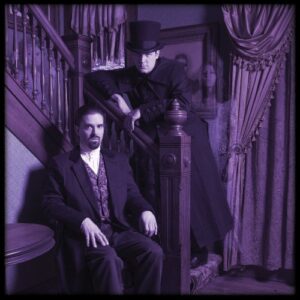 BTL: I want to follow that by asking if you ever watch horror movies and feel that the music is completely wrong for the images? Some of the composers I’ve spoken to feel that way when they see their music used as temp.
BTL: I want to follow that by asking if you ever watch horror movies and feel that the music is completely wrong for the images? Some of the composers I’ve spoken to feel that way when they see their music used as temp.
Goszka: I think, for me, I take it in as an entire experience. I can’t remember a time where the music pulled me out to that degree. There might have been, but I can’t remember what it would have been, and it was very rare. Usually, it all works together, the visuals and the sound and everything. You don’t notice it, because it’s seamless, it’s like an entire experience, and I think that’s a good thing. I guess if it was calling attention to itself, it probably wouldn’t be a good thing.
Douglas: I do watch films, and I try to really just get immersed in the film and lose myself in it and enjoy it. I think more often, if the music makes me [think about it], it’s probably because I like it, or it’s doing something that I’m like, “Oooo, nice theme” or “I’m really liking what they’re doing sonically here.” I think 99 times out of 100, if I’m noticing the music in a film, it’s because of something that I like about it, or I like the moment that they’re creating. I think there’s been a couple of times where the music has taken me out of it for a little bit, but I would say it’s in some of the older films, maybe occasionally have that, where it might take me off for a little bit. I don’t know why that is.
BTL: Is there anything you want to say about the most recent Midnight Syndicate EP, Bloodlines, and the live album?
Goszka: The live album was cool, because we’ve been doing these shows for… this is our fifth year at Cedar Point, so it’s nice to be able to pull back from all that material and put it into something that people outside the Ohio area can enjoy, because we realize not everybody is going to be able to come out to Sandusky to see the shows if you’re on the coast. It’s kind of a bigger endeavor to get out there, so it was great to be able to have the recordings and be able to do that. For Bloodlines, 13 Hour has been one of our most popular albums. It’s definitely one of our favorite albums with that theme of just a classic haunted mansion kind of thing. When thinking about what to do for a release for this year, we were kind of limited by time and everything. We knew we wouldn’t be able to do a full-length album, but that theme just kind of really came to the forefront. Let’s visit the Haverghast family that you’ll find [their] origins on Gates of Delirium, and do a prequel, basically, and set up The 13th Hour. One of the coolest things is that the end of Bloodlines tails seamlessly right into The 13th Hour, so if you want to listen to them back to back, it is designed to be just this complete listening experience.
BTL: I do want to talk more about the live shows, and the residency you do at Cedar Point every year, except for last year, due to COVID. Do you ever tour and go other places with these shows?
Goszka: It’s really just been Cedar Point other than for the first self-titled Midnight Syndicate album [when Ed] did the live show here in Cleveland. But it’s really just been focusing on Cedar Point. The elements that are involved in that, it’s a lot to try and bring on the road. Beyond the cast and everything, you’ve got all the lights and just everything that goes into making the show what it is. I don’t want to give away spoilers by naming too many specific elements, but there’s a lot. It’s more than just us playing and some films rolling in the background. Things are happening in the theater and what have you. That’s always been a challenge when we thought about taking that on the road, like how do you do that? How do you make it work?
Douglas: That being said, I think with every year that we do the show, we acquire more experience and more content and more ideas for how we could do a possibly altered show, maybe somewhat scaled-down but yet still effective show, that we could take to certain events or certain places, because that’s definitely something we need to do at some point. I would say with every passing year, we get closer to being able to do something that we’d be able to take to other venues.
If you’re in the Ohio area, The Midnight Syndicate are finishing up this year’s Cedar Point run, dubbed “Conspiracy of Shadows,” at Cedar Point in Sandusky, Ohio. If not, most or all of their albums are available either on their website shop or via streaming platforms, for which you can also get links on their site.
All images courtesy the Midnight Syndicate. (Click on images for larger size.)





